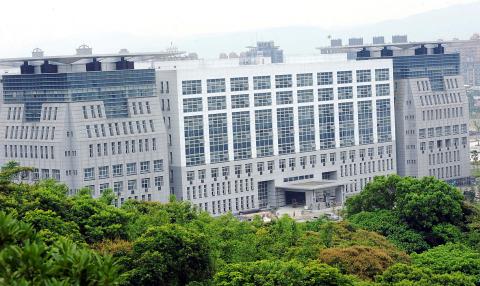The lack of protection against electromagnetic pulse (EMP) weapons at the Ministry of National Defense’s (MND) new headquarters is “irresponsible” and could endanger Taiwan, a Democratic Progressive Party (DPP) lawmaker said yesterday.
Senior military leaders told the Chinese-language Liberty Times (the Taipei Times’ sister newspaper) that the buildings under construction in Taipei’s Dazhi (大直) would not be outfitted with EMP countermeasures as planned because of budget problems.
The NT$200 million (US$6.9 million) system was scrapped despite comprising just 1.3 percent of the facility’s total construction budget and the NT$84 million already invested in the system, the Liberty Times quoted sources as saying, adding that the military was not happy.

Photo: Chang Chia-ming, Taipei Times
The information comes amid news that China has been developing EMP weapons in the event of a conflict with Taiwan.
EMP weapons can be used to emit a huge pulse of electromagnetic radiation that can knock out all electronics — particularly computers — over a widespread area.
“The Ministry of National Defense should have built the protection regardless of its budgetary concerns,” DPP Legislator Tsai Huang-liang (蔡煌瑯) said.
“Without it, it is like a soldier going to a battlefield not carrying a gun. Our whole military network could be completely taken offline,” Tsai said.
The long-delayed headquarters complex has been under construction since 2003. Originally envisioned to be a state-of-the-art facility, the construction process has been plagued by contractor problems, including a bankruptcy, leading to a Control Yuan probe.
The report about the lack of an EMP shield could trigger new questions over the practicality of the NT$15.8 billion project.
Military analysts believe that China could be planning to cause a massive low-altitude EMP burst over Taiwan in the event of an armed conflict in such a way that would severely damage electronics — disabling weapons systems — but kill few people and not impact China.
That scenario was detailed by a 2005 National Ground Intelligence Center report declassified earlier this month. China’s EMP capability could be used as a surprise measure after an initial strike to help dissuade the US from intervening, the report said.
Ministry spokesperson Colonel Lo Shao-ho (羅紹和) told the Liberty Times that the decision to drop EMP protection was made four years ago after changes to the building’s design increased construction costs. However, the NT$84 million already invested in the system meant it could be added at a later point, he said.
Chinese Nationalist Party (KMT) Legislator Lin Yu-fang (林郁方) said the system should be put in place now, given the concerns raised by the recently released intelligence report.
“It should be finished,” Lin said. “One EMP blast could immediately knock out any product using a power transformer, including computers and other electronics ... it would be too late to deal with the aftereffects.”

CHAOS: Iranians took to the streets playing celebratory music after reports of Khamenei’s death on Saturday, while mourners also gathered in Tehran yesterday Iranian Supreme Leader Ayatollah Ali Khamenei was killed in a major attack on Iran launched by Israel and the US, throwing the future of the Islamic republic into doubt and raising the risk of regional instability. Iranian state television and the state-run IRNA news agency announced the 86-year-old’s death early yesterday. US President Donald Trump said it gave Iranians their “greatest chance” to “take back” their country. The announcements came after a joint US and Israeli aerial bombardment that targeted Iranian military and governmental sites. Trump said the “heavy and pinpoint bombing” would continue through the week or as long

TRUST: The KMT said it respected the US’ timing and considerations, and hoped it would continue to honor its commitments to helping Taiwan bolster its defenses and deterrence US President Donald Trump is delaying a multibillion-dollar arms sale to Taiwan to ensure his visit to Beijing is successful, a New York Times report said. The weapons sales package has stalled in the US Department of State, the report said, citing US officials it did not identify. The White House has told agencies not to push forward ahead of Trump’s meeting with Chinese President Xi Jinping (習近平), it said. The two last month held a phone call to discuss trade and geopolitical flashpoints ahead of the summit. Xi raised the Taiwan issue and urged the US to handle arms sales to

BIG SPENDERS: Foreign investors bought the most Taiwan equities since 2005, signaling confidence that an AI boom would continue to benefit chipmakers Taiwan Semiconductor Manufacturing Co’s (TSMC, 台積電) market capitalization swelled to US$2 trillion for the first time following a 4.25 percent rally in its American depositary receipts (ADR) overnight, putting the world’s biggest contract chipmaker sixth on the list of the world’s biggest companies by market capitalization, just behind Amazon.com Inc. The site CompaniesMarketcap.com ranked TSMC ahead of Saudi Aramco and Meta Platforms Inc. The Taiwanese company’s ADRs on Tuesday surged to US$385.75 on the New York Stock Exchange, as strong demand for artificial intelligence (AI) applications led to chip supply constraints and boost revenue growth to record-breaking levels. Each TSMC ADR represents

State-run CPC Corp, Taiwan (CPC, 台灣中油) yesterday said that it had confirmed on Saturday night with its liquefied natural gas (LNG) and crude oil suppliers that shipments are proceeding as scheduled and that domestic supplies remain unaffected. The CPC yesterday announced the gasoline and diesel prices will rise by NT$0.2 and NT$0.4 per liter, respectively, starting Monday, citing Middle East tensions and blizzards in the eastern United States. CPC also iterated it has been reducing the proportion of crude oil imports from the Middle East and diversifying its supply sources in the past few years in response to geopolitical risks, expanding